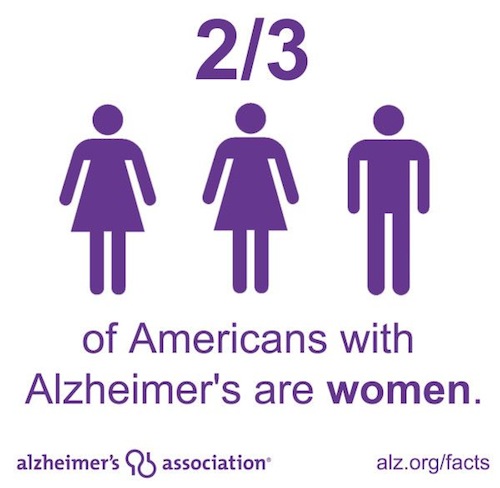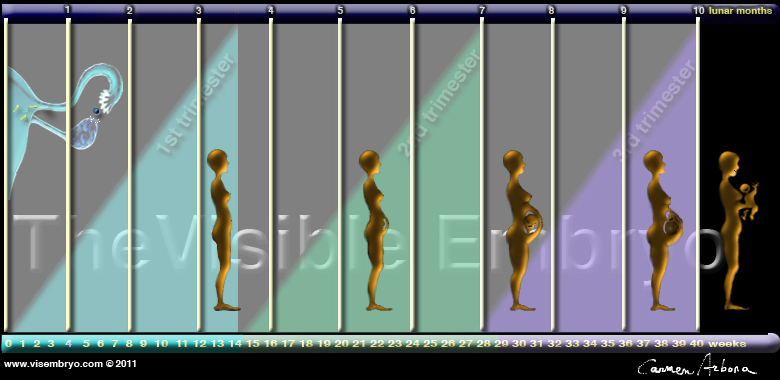|
|
Developmental Biology - Female Aging
Female 'Stress' Links to Alzheimer's
Learning stress coping techniques might help delay Alzheimer's disease in women...
A new analysis of data on more than 900 Baltimore adults by researchers at Johns Hopkins School of Medicine, has linked stressful life experiences among middle-aged women - not men - to memory decline in late forties and older.
These findings add to evidence that stress hormones play an uneven gender role in brain health, and align with well documented higher rates of Alzheimer's disease in women than men.
Researchers caution the study was designed to show associations among phenomena — not cause and effect. But, if future studies demonstrate stress response factors into cause of dementia, strategies designed to combat or moderate stress may prevent or delay cognitive decline.
The findings are published in the July issue of the International Journal of Geriatric Psychiatry.
According to the Alzheimer's Association, 1 in 6 women over age 60 will get Alzheimer's disease, compared with 1 in 11 men. There currently are no proven treatments that prevent or halt progression of the disease.
"We can't get rid of stressors, but we might adjust the way we respond to stress, and have a real effect on brain function as we age," says Cynthia Munro PhD, associate professor of psychiatry and behavioral sciences at the Johns Hopkins University School of Medicine. "And although our study did not show the same association for men, it sheds further light on the effects of stress response on the brain with potential application to both men and women," she adds.
According to Munro, prior research by other investigators shows the effect of age on stress response is three times greater in women than in men. Separately, other research has shown that stressful life experiences can result in temporary memory and cognitive problems.
To further explore whether stressful life experiences can be linked to developing long-term memory problems in women especially, Munro and her team used data collected on 909 Baltimore residents for the National Institute of Mental Health Epidemiologic Catchment Area study. That study recruited participants from 1981 to 1983 from five cities in the U.S. to determine the prevalence of psychiatric disorders.
Some 63% of the participants were women and 60% were white. Participants were an average age of 47 during their mid-life check-in in the 90s.
After enrollment, participants returned to trial sites for interviews and checkups three additional times: once in 1982, once between 1993 and 1996, and once between 2003 and 2004. During the third visit, participants were asked if they experienced a traumatic event in the past year such as combat, rape, a mugging, some other physical attack, watching someone else attacked or killed, receiving a threat, or living through a natural disaster. Some 22% of men and 23% of women reported at least one traumatic event within the past year before their visit.
They also were asked about stressful life experiences such as a marriage, divorce, death of a loved one, job loss, severe injury or sickness, a child moving out, retirement, or birth of a child. About 47% of men and 50% of women reported having at least one stressful life experience in the year before their visit. At the third and fourth visits, the researchers tested the participants using a standardized learning and memory test developed by Iowa researchers. The test included having participants recall 20 words spoken aloud by the testers immediately after they heard them, and again 20 minutes later.
At the third visit, participants could recall on average eight words immediately and six words later. Participants also had to identify the words spoken to them among a written list of 40 words. During the third visit, participants correctly identified on average 15 words. By the fourth visit, participants recalled an average of seven words immediately, six words after a delay, and correctly recognized almost 14 words.
Researchers measured any decreases in performance on the tests between the third and fourth visits, and then compared those decreases with participants' reports of stressful life experiences or traumatic events to see if there was an association.
Munro's team found having a greater number of stressful life experiences over the last year of midlife in women was linked to a greater decline in recalling words later and recognizing those words.
Women who experienced no stressful life experiences within the past year at the third visit were able to remember on average 0.5 fewer words when given the same memory test at the fourth visit. Women with one or more stressful life experiences, however, recalled on average one fewer word at the fourth visit than they had at the third visit. The ability to recognize words declined by an average of 1.7 words for women with at least one stressor at the third visit compared with a 1.2-word decline for women without stressors at midlife.
However, they didn't see the same trend in women who had traumatic events. Munro says finding this suggests that ongoing stress, such as divorce, may have more of a negative impact on brain functioning than distinct traumatic events. This makes sense, Munro believes, because what we call "chronic stress" can impair the body's ability to respond to stress in a healthy manner.
Researchers did not see any association in men between a drop in word recall or recognition and experiencing either stressful life experiences or traumatic events in midlife. Stress much earlier in life also wasn't predictive of cognitive decline later in either men or women.
"A normal stress response causes a temporary increase in stress hormones like cortisol, and when it's over, levels return to baseline and you recover.
But with repeated stress, or with enhanced sensitivity to stress, your body mounts an increased and sustained hormone response that takes longer to recover. We know if stress hormone levels increase and remain high, this isn't good for the brain's hippocampus - the seat of memory."
Cynthia A. Munro PhD, Associate Professor of Psychiatry and Behavioral Sciences, Johns Hopkins Bayview Medical Center, Baltimore, Maryland, USA.
The researchers say stress reduction hasn't gotten a whole lot of attention compared with other factors which may contribute to dementia or Alzheimer's — and it might be worth exploring stress management techniques as a way to delay or prevent disease.
Munro adds medications are being developed to combat how our brains handle stress, and that these may be used in conjunction with other behavioral stress coping techniques to reduce the impact of stress on aging minds.
Alzheimer's Disease International reports 44 million people worldwide live with Alzheimer's disease.
Abstract
Introduction
The reasons why women are at higher risk than men for developing dementia are unclear. Although studies implicate sex differences in the effect of stress on cognitive functioning, whether stressful life events are associated with subsequent cognitive decline has received scant research attention.
Methods
In Wave 3 (1993–1996) of the Baltimore Epidemiologic Catchment Area study, 337 men and 572 women (mean age = 47 years) reported recent (within the last year) and remote (from 1981 until 1 year ago) traumatic events (eg, combat) and stressful life events (eg, divorce/separation). At Waves 3 and 4 (2004–2005), they completed the Mini Mental State Examination (MMSE) and a word-list memory test. Multivariable models were used to examine the association between traumatic and stressful life events at Wave 3 and cognitive change by Wave 4.
Results
A greater number of recent stressful life events at Wave 3, but not of more remote stressful events, was associated with greater verbal memory decline by Wave 4 in women but not in men. Stressful events were not associated with change in MMSE, and there were no associations between traumatic events occurring at any time and subsequent memory or MMSE decline in either sex.
Conclusions
Unlike men, middle-aged women with a greater number of recent stressful life events demonstrate memory decline over a decade later. Sex differences in cognitive vulnerability to stressful life events may underlie women's increased risk of memory impairment in late life, suggesting that stress reduction interventions may help prevent cognitive decline in women.
Authors
Cynthia A. Munro, Alexandra M. Wennberg, Nicholas Bienko, William W. Eaton, Constantine G. Lyketsos, Adam P. Spira.
Other authors of the paper were Alexandra Wennberg of Mayo Clinic and Nicholas Bienko, William Eaton, Constantine Lyketsos and Adam Spira of Johns Hopkins.
Acknowledgements
The research was funded by the National Institute on Aging (AG052445).
Spira has consulted for Awarables, Inc.
Return to top of page.
| |
|
Aug 9 2019 Fetal Timeline Maternal Timeline News
 Unlike men, middle-aged women with a greater number of recent stressful life events demonstrate memory decline over a decade later. Sex differences in cognitive vulnerability to stressful life events may underlie women's increased risk of memory impairment in late life, suggesting that stress reduction interventions may help prevent cognitive decline in women.
|



